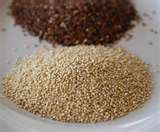Grain is not a Class A food, being difficult to digest, and causing "allergic" problems. Wheat, rye, barley and oats contain a substance called gluten, which is the source of many of these problems. The best way, to use grains is to sprout them and eat them raw. Wheat and rye berries and oat groats may be sprouted—the soaking and sprouting is said to neutralize the gluten, but some people still have problems with wheat and rye, even when sprouted. Oats seem to cause fewer problems, and rolled oats may be eaten raw.
Grain, ground into flour, and baked into bread along with other ingredients, including yeast and sweeteners, is not recommended. Some gluten-free breads are sometimes available, but, while these cause little or no "allergic" problems, they are still not the best food.
Buckwheat groats are grouped with the grains, although not really a grain, and not a "wheat." They are actually the fruit, rather than the seed (as most grains are ) of the buckwheat plant. Most people do not have a problem with buckwheat and it is safe to say you probably won't either. I would be cautious however if you have been diagnosed with Celiac. You may want to test them in a "mono" meal and wait up to 3 days to see if you develop an old symptom; of course if your not symptom free you may want to give up grains for several months before trying this test.
Brown rice is probably the best of the grains and is the staple article of food in the diet of more than half of the world's people.
But all grains are excessively acid-forming and require much time and energy for digestion, so that being said you may want to consider skipping grains all together.If you do eat grains eat them sparingly and stick with buckwheat, millet, oats and quinoa.
If your dealing with chronic bladder pain, infections or any other chronic illness you should consider giving up grains for at least 90 days and then introduce only the grains mention above one at a time back into your diet in small mono meals.
I have research grains in-depth and put them to the test and being a 29 year veteran of IC and a myriad of auto immune symptoms, I feel confident in saying that small servings of the following grains: buckwheat, millet, oats, brown rice and quinoa (all gluten free) are safe to eat and provide you with nutritional benefits.
If your presently suffering with chronic bladder pain you should avoid all grains until your pain is under control and then only eat small amounts of gluten free grains.
A gluten free diet can provide the benefit of relieving and preventing the ailments associated with irritable bowel syndrome, celiac disease, gluten sensitivity, and more than 200 chronic illnesses and conditions.
American eat far to many grains, causing the body to become extremely acidic which causes chronic illness.
"The foods with the highest micronutrient per calorie scores are green vegetables, colorful vegetables, and fresh fruits. For optimal health and to combat disease, it is necessary to consume enough of these foods that deliver the highest concentration of nutrients"~ Dr. Fuhrman

Buckwheat flour is raw flour. The taste of Buckwheat is light and bland. Buckwheat pancakes have a nice taste, and a slightly rougher texture than conventional pancakes.
The composition of buckwheat flour is approximately: 63% carbohydrate, 11.7% protein, 2.4% fat, 9.9% fiber, 11% water and 2% minerals. Buckwheat contains rutin, a medicinal chemical that strengthens capillary walls, reducing hemorrhaging in people with high blood pressure and increasing microcirculation in people with chronic venous insufficiency Buckwheat contains D-chiro-inositol, a component of the secondary messenger pathway for insulin signal transduction found to be deficient in Type II diabetes and Polycystic Ovary Syndrome (PCOS). It is being studied for use in treating Type II diabetes.
A buckwheat protein has been found to bind cholesterol tightly. It is being studied for reducing plasma cholesterol in people with an excess of this compound.

Oats are naturally gluten free, so what is the concern for people with celiacs or trying to be gluten free? The concern is that if oats are grown in a field that previously grew other gluten containing grains, some of those other gluten containing grains will naturally grow in the oat field the next year, which will then cause the oats harvested from that field to be contaminated.
Find gluten free oats by clicking here - http://www.glutenfreeoats.com/shopsite_sc/index.html

Most commonly considered a grain, quinoa is actually a relative of leafy green vegetables like spinach and Swiss chard. It is a recently rediscovered ancient "grain" once considered "the gold of the Incas."
Alkaline is vital to our well-being and that quinoa is one of many great alkaline diet foods that we can eat to be successful with an alkaline diet.
Find a variety of quinoa products here: http://www.amazon.com/s/ref=nb_sb_noss?url=search-alias%3Daps&field-keywords=quinoa&x=0&y=0
Conclusion: I gave up grains for a year, lost 31 pounds, and had far less constipation and urinary retention and allergies.
Many food stores carry gluten free oats, buckwheat, quinoa and brow rice.
I buy most of my products at Whole Food Market.

